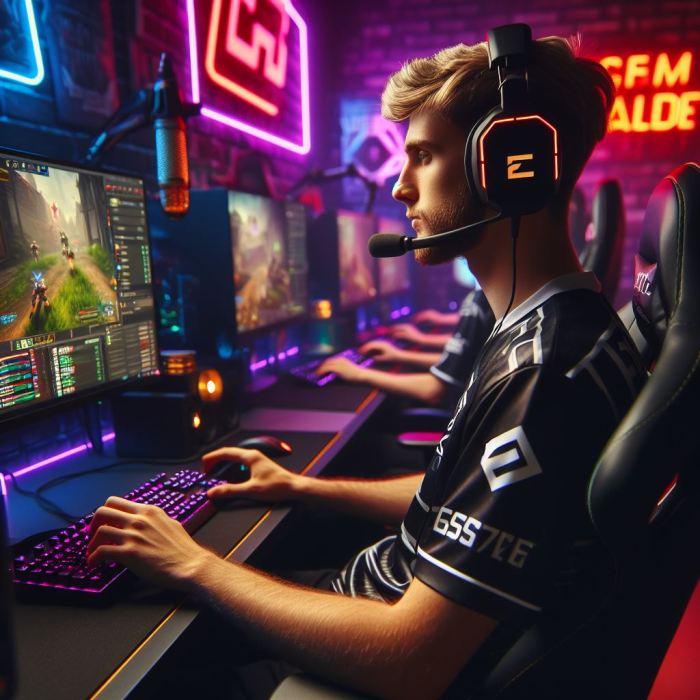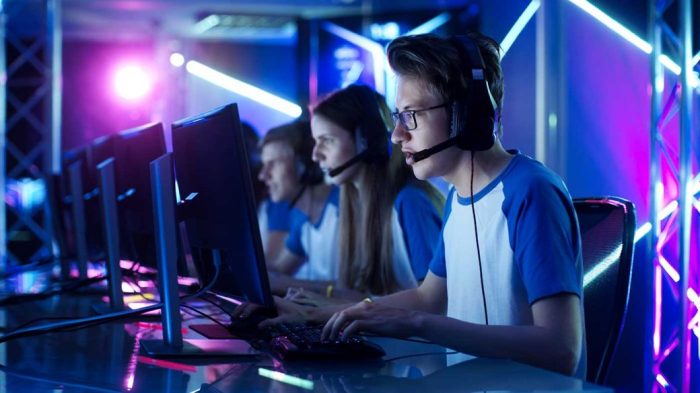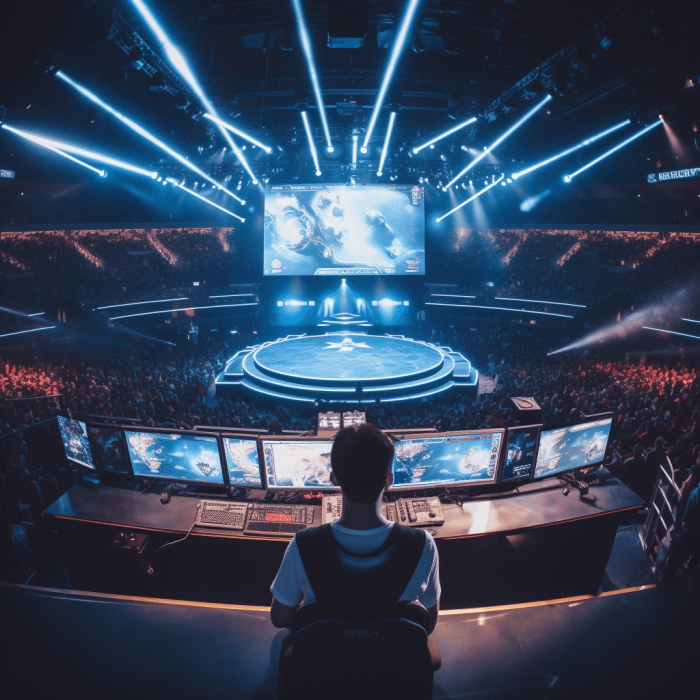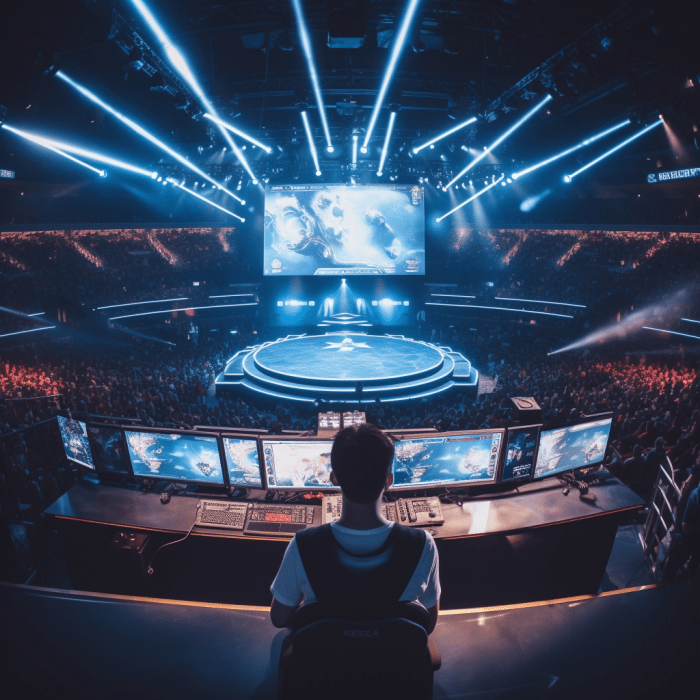Pro gaming careers offer a thrilling path for skilled gamers, transforming passion into profession. This isn’t just about playing games; it’s about mastering strategy, building a brand, and navigating the competitive world of esports. From intense tournaments to lucrative sponsorships, the journey demands dedication, skill, and a savvy business sense. This exploration delves into the realities of pro gaming, revealing the opportunities and challenges that await those who dare to compete at the highest level.
We’ll cover everything from choosing the right game and honing your skills to building a powerful online presence and securing lucrative sponsorships. We’ll also address the often-overlooked aspects of a pro gaming career, including financial planning, mental health, and alternative career paths within the booming esports industry. Get ready to game the system—and your way to success.
Training and Skill Development

Becoming a pro gamer isn’t just about natural talent; it demands rigorous training and strategic skill development. Think of it like becoming a professional athlete – years of dedicated practice, focused training, and a commitment to continuous improvement are crucial. This section explores the key elements of transforming raw potential into competitive prowess.Consistent practice and strategic training are paramount for aspiring pro gamers.
Simply playing the game isn’t enough; you need a structured approach to hone your skills and address weaknesses. This includes targeted practice sessions focused on specific mechanics, strategic play, and adapting to different opponents and scenarios. Professional players often spend hours each day refining their skills, analyzing replays of their matches, and studying their opponents’ strategies. This dedicated practice is what separates the good from the great.
The Importance of Teamwork and Communication
Effective teamwork and communication are essential for success in most professional games. Many competitive games rely heavily on coordination, strategy, and clear communication between teammates. A team’s ability to work together seamlessly, anticipating each other’s moves and reacting effectively to changing circumstances, significantly impacts their overall performance. Miscommunication or a lack of coordination can lead to critical errors and lost matches, highlighting the importance of clear and concise communication during gameplay.
For example, in a game like League of Legends, precise communication regarding objectives, enemy positioning, and planned actions is vital for executing team strategies successfully.
Sample Training Regimen for a Beginner (Example: Overwatch)
This regimen focuses on Overwatch, a popular team-based shooter. Adapting it to other games requires adjusting the specific skill-focused drills.
This regimen assumes a 3-hour daily commitment, which can be adjusted based on individual availability.
- Warm-up (30 minutes): Quick play matches to get familiar with the game mechanics and loosen up.
- Aim Training (45 minutes): Use aim trainers like KovaaK’s or aim lab to improve accuracy and reaction time. Focus on specific scenarios like tracking moving targets and flick shots.
- Hero-Specific Practice (45 minutes): Choose one or two heroes and focus on mastering their abilities and playstyle. Practice in a training range or custom games.
- Team Play (1 hour): Play competitive matches to apply learned skills and practice teamwork. Focus on communication and coordination with teammates.
- Review and Analysis (30 minutes): Watch replays of your matches, identifying mistakes and areas for improvement. Analyze successful plays and strategize for future games.
Strategies for Improving Individual Skills
Improving individual skills involves a multifaceted approach.
Several methods exist to enhance specific skills.
- Aim: Consistent aim training using aim trainers, focusing on different scenarios and practicing with various sensitivities.
- Reaction Time: Utilizing reaction time training apps and games, and practicing quick reflexes in-game.
- Game Sense: Studying professional players, analyzing game replays, and understanding map awareness and strategic positioning.
“Consistent practice isn’t just about quantity; it’s about quality and focused effort.”
Securing Sponsorships and Contracts

Landing sponsorships and contracts is crucial for any pro gamer aiming for financial stability and career longevity. The right deals can provide not only income but also valuable resources like equipment, coaching, and exposure to a wider audience. Understanding the landscape of sponsorship opportunities and negotiating effectively are essential skills.
Types of Sponsorship Deals, Pro gaming careers
Professional gamers can secure a variety of sponsorship deals, each offering unique benefits and obligations. These can range from simple equipment endorsements to comprehensive, multi-year partnerships. Common types include:
- Equipment Sponsorships: These involve using and promoting specific gaming peripherals (keyboards, mice, headsets) or hardware (computers, monitors). The sponsor provides the equipment and often a fee in exchange for prominent display of their logo during streams and competitions.
- Software Sponsorships: Similar to equipment sponsorships, but focusing on software such as gaming chairs, streaming software, or anti-cheat programs.
- Financial Sponsorships: These are straight-up cash payments, often tied to performance metrics like tournament wins or viewership milestones. These can be a significant source of income.
- Brand Ambassadorships: These broader deals involve representing a company’s image and values beyond just their products. They often include marketing campaigns and social media engagement.
Esports Organization vs. Independent
The decision to sign with a large esports organization or remain independent significantly impacts a gamer’s career trajectory.
Large Esports Organizations: Offer structured support (salaries, coaching, team facilities, marketing assistance), but often involve a share of earnings and less control over personal branding. Think of established teams like Cloud9 or FaZe Clan. They offer resources and stability, but can be restrictive.
Independent Gamers: Maintain complete control over their brand and earnings, but bear the full responsibility for securing sponsorships, managing their careers, and covering all expenses. This path offers more freedom but requires strong self-management skills and a robust network.
Effective Negotiation Strategies
Successful sponsorship negotiations require preparation and a clear understanding of your value proposition.
- Know Your Worth: Research comparable deals and understand your market value based on your achievements, audience size, and engagement metrics.
- Clearly Define Objectives: Artikel specific goals for the sponsorship, such as increased brand awareness, improved performance, or expanded reach.
- Negotiate Multiple Aspects: Don’t solely focus on monetary compensation. Negotiate for perks like equipment, travel, or marketing support.
- Secure Legal Counsel: It’s crucial to have a lawyer review any contract before signing to ensure your rights are protected.
Sample Sponsorship Proposal
Here’s a simplified example of a sponsorship proposal:
To: [Sponsor Company Name]
From: [Gamer Name/Team Name]
Date: October 26, 2023
Subject: Sponsorship Proposal
Introduction: [Gamer Name/Team Name] is a rising star/established team in the [Game Name] esports scene, boasting [Number] followers on [Platform] and consistently achieving top rankings in major tournaments. We propose a mutually beneficial partnership that leverages our established audience and your brand’s reach.
Value Proposition: We offer unique opportunities for brand visibility through integrated sponsorships during live streams, tournament appearances, and social media engagement. Our targeted audience aligns perfectly with your [Sponsor’s Target Demographic], offering high-impact exposure and brand affinity.
Proposed Partnership: We propose a [Duration] sponsorship agreement, including [Specific Activities: e.g., logo placement on stream overlay, social media mentions, in-game branding]. Our detailed media kit, attached, provides further information on our audience demographics and engagement metrics.
Compensation: We are seeking [Amount] in [Currency] for this partnership, with potential performance-based bonuses. We are open to discussing alternative compensation structures.
Conclusion: We believe this partnership offers a unique opportunity to connect with a passionate and engaged audience. We welcome the chance to discuss this proposal further and answer any questions you may have.
The Business Side of Pro Gaming

So, you’ve honed your skills, secured sponsorships, and are now a professional gamer. Congrats! But the journey doesn’t end there. The business side of pro gaming is just as crucial as your in-game performance. Understanding the financial, legal, and managerial aspects will significantly impact your long-term success and financial security. This section dives into the key elements you need to navigate this complex landscape.
The Role of Agents and Managers in Professional Gaming
Agents and managers play a vital role in a pro gamer’s career, acting as intermediaries between the player and various stakeholders. A good agent will negotiate contracts, secure sponsorships, and manage your public image. They handle the business side of things, allowing you to focus on what you do best: gaming. Managers often handle a wider range of tasks, including financial planning, marketing, and social media management.
Think of them as your personal business team, guiding your career path and ensuring you’re making the most of your opportunities. A strong agent-manager relationship is essential for long-term success. Many successful athletes in traditional sports utilize similar support systems, and the esports industry is increasingly adopting these strategies.
Financial Planning and Investment Management for Pro Gamers
Professional gaming, while lucrative for some, is also notoriously volatile. A consistent income stream isn’t guaranteed, and careers can be surprisingly short. Therefore, diligent financial planning is paramount. This involves creating a realistic budget, tracking income and expenses, and investing wisely for the future. Consider setting up a retirement account, exploring diverse investment opportunities, and working with a financial advisor to develop a long-term financial strategy.
For example, a pro gamer earning $100,000 annually should allocate a significant portion towards retirement savings, emergency funds, and investments to build long-term wealth. Failure to plan effectively can lead to financial instability once the competitive gaming career concludes.
Legal Aspects of Contracts, Intellectual Property, and Streaming Rights
Navigating the legal complexities of professional gaming is crucial. Contracts with teams, sponsors, and streaming platforms require careful review and understanding. Protecting your intellectual property, such as your brand and online content, is also vital. Understanding streaming rights and regulations, particularly regarding music and game content, is essential to avoid legal issues. Seeking legal counsel to review contracts and understand your rights is highly recommended.
Many pro gamers have faced legal battles over image rights or contract disputes, highlighting the importance of proactive legal protection. A well-drafted contract can prevent significant problems down the line.
Creating a Simple Budget for Managing Income and Expenses
A simple budget helps manage your finances effectively. Start by tracking all income sources, including tournament winnings, sponsorships, streaming revenue, and endorsements. Then, list all expenses, such as rent, utilities, food, travel, equipment, and taxes. Categorize your expenses and identify areas where you can cut back. A good rule of thumb is to allocate a percentage of your income to savings, investments, and essential expenses.
For example:
| Category | Percentage |
|---|---|
| Essential Expenses (Housing, Food, Utilities) | 50% |
| Savings & Investments | 20% |
| Taxes | 15% |
| Entertainment & Discretionary Spending | 15% |
Remember, this is a sample budget; adjust percentages based on your individual circumstances and financial goals.
Alternative Career Paths in the Esports Industry

So, you’re passionate about esports but don’t see yourself as a pro player? Don’t worry, the industry is booming, and there are tons of other awesome career paths you can explore. From coaching rising stars to building the next big esports game, the possibilities are practically endless. Let’s dive into some of the most popular alternatives.
Coaching
Esports coaching is a high-demand role requiring deep game knowledge, strategic thinking, and strong interpersonal skills. Coaches analyze gameplay, identify weaknesses, and develop training plans to improve player performance. Successful coaches often have a strong competitive background themselves, understanding the pressures and intricacies of professional play. Salary expectations vary widely based on the team’s level of competition (collegiate, amateur, professional) and the coach’s experience, ranging from a modest income to a comfortable six-figure salary for top-tier coaches.
Streaming and Content Creation
Streaming and content creation are hugely popular avenues in esports. Streamers build communities around their gameplay, often generating income through subscriptions, donations, and sponsorships. Content creators, meanwhile, produce videos, articles, and other media related to esports, often working with teams, organizations, or media outlets. Income can range from modest for smaller streamers to extremely lucrative for those with large and engaged audiences.
Success requires a charismatic personality, consistent content creation, and a strong understanding of social media marketing.
Game Development
The esports industry thrives on the games themselves, creating significant opportunities for game developers. Roles range from programmers and designers to artists and producers. These roles require a strong technical skillset and a passion for game design. Salaries are generally competitive, reflecting the high demand for skilled professionals in this field. Experienced developers working on popular esports titles can command very high salaries.
Esports Journalism and Commentary
Esports journalism and commentary involve reporting on esports news, interviewing players and personalities, and providing insightful analysis of matches and tournaments. This career path demands strong writing skills, a deep understanding of the esports scene, and the ability to engage a broad audience. Salaries are competitive, varying based on experience and platform. Successful commentators and journalists can gain significant recognition and build a substantial following.
| Career Path | Job Prospects | Salary Expectations | Education/Experience |
|---|---|---|---|
| Coaching | High, especially for popular games | Varies widely; $30,000 – $150,000+ per year | Competitive gaming experience, strong game knowledge, leadership skills |
| Streaming/Content Creation | High, but competitive | Varies greatly; $0 – $1,000,000+ per year | Strong personality, consistent content creation, marketing skills |
| Game Development | High, strong technical skills needed | Competitive; $60,000 – $150,000+ per year | Computer science degree or equivalent experience, programming skills |
| Esports Journalism/Commentary | Moderate to high, depending on niche | Varies; $40,000 – $80,000+ per year | Journalism degree or equivalent experience, strong writing and communication skills |
Question & Answer Hub: Pro Gaming Careers
How long does it take to become a pro gamer?
There’s no set timeline. Some rise quickly, others take years of dedicated practice and competition. Success depends on talent, dedication, and opportunity.
What if I’m not the best player in the world?
Even if you’re not a top-tier player, there are many roles in esports: coaching, streaming, content creation, and more. Find your niche and build from there.
How do I find a team or organization?
Network at tournaments, online communities, and through esports organizations’ recruitment efforts. A strong online presence and competitive gameplay are key.
What about education? Is a college degree necessary?
A college degree isn’t required, but business and marketing knowledge can be invaluable for managing your career and finances.
